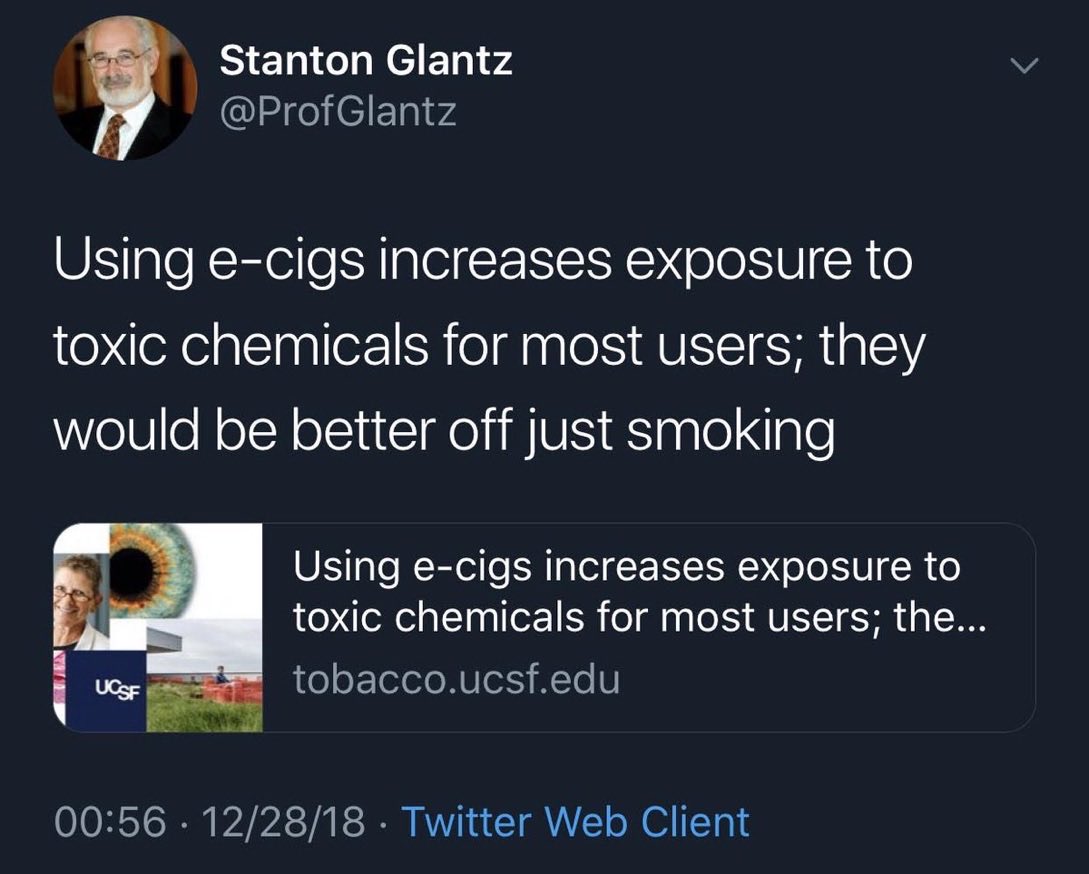Stanton Glantz is back with another ridiculous hot take about vaping and people have been slamming him for it during an exchange about the evidence in his latest paper - “Population-Based Disease Odds for E-Cigarettes and Dual Use versus Cigarettes”, published in New England Journal of Medicine Evidence (NEJM Evidence).
The editors of NEJM Evidence write: “In volume 3, number 3 of NEJM Evidence, we published an article… by Glantz et al. In that report, the authors conducted a meta-analysis to estimate the pooled odd ratios for a number of health effects associated with the use of e-cigarettes, dual use of e-cigarettes and cigarettes, and use of cigarettes alone.”
In their paper, Stanton Glantz, Nhung Nguyen, and Andre Luiz Oliveira da Silva state that there is “a need to reassess the assumption that e-cigarette use provides substantial harm reduction across all cigarette-caused diseases, particularly accounting for dual use.”
Martin Dockrell, Tobacco Control Programme Lead for the UK Health Security Agency (was Public Health England), said: “Claims that e-cigarettes are as bad as cigarettes are premature and misrepresent the evidence."
The editors of NEJM Evidence have published two responses to the Glantz paper, arguing that all opinions are valid because, “No single research article serves as the ‘final word’ on a given topic.”
This is like having climate experts in one corner being debated by a small over-tired child in the other. Glantz has been objectively proven wrong on all of his submissions about vaping (POTV news articles passim).
K. Michael Cummings, Ph.D., M.P.H., Nancy A. Rigotti, M.D., Neal L. Benowitz, M.D., and Dorothy K. Hatsukami, Ph.D. wrote in response that the small number of e-cigarette–exposed persons with cardiovascular disease/other chronic health problems “is a problem that plagues many of the articles included in the meta-analysis.”

They point out the complete lack of any long-term epidemiologic studies and therefore researchers should focus on assessing the exposure and effect of biomarkers.
Slamming the trio, that state: “We question why the authors dismissed evidence from biomarker studies because they provide the best short-term objective evidence of the biologic plausibility of the harm reduction potential of e-cigarettes.”
They highlight a series of problems with the studies used and say there is no possibility of concluding there is a causal effect between vaping and cardiovascular disease/other chronic health problems.
“Additionally,” they continue, “no evidence of a dose–response association between e-cigarette use (i.e., duration and frequency) and disease outcomes was provided.”
They question why the authors completely failed to consider variations in exposures from cigarettes and e-cigarettes in dual users and “failed to explicitly compare health risks of e-cigarette users against recent former smokers who quit without using an e-cigarette because the presumed health benefits of e-cigarettes versus continued smoking are predicted in former smokers.”
The second response, from Jamie Hartmann-Boyce, Ph.D., Steven Cook, Ph., and Jonathan Livingstone-Banks, Ph.D., stated Glantz’ work “contains two serious methodologic flaws” – but then the same could be said about all of his work.
They questioned the inherent bias in the studies they selected, implying the bias held by Glantz, Nguyen, and da Silva.
Damningly, they add: “Selective reporting cannot be ruled out”.
In addition, they state that Glantz et al. ignored “an internationally recognised standard for assessing certainty in evidence”. Hartmann-Boyce, Cook, Livingstone-Banks say all of the studies contained in Glantz’ analysis contained “low grade” evidence.
So, once again, Stanton Glantz has produced an exceptionally poor piece of work with the sole aim of vilifying tobacco harm reduction – with the result that if it were considered in the construction of legislation would lead to keeping people smoking.
Dave Cross
Journalist at POTVDave is a freelance writer; with articles on music, motorbikes, football, pop-science, vaping and tobacco harm reduction in Sounds, Melody Maker, UBG, AWoL, Bike, When Saturday Comes, Vape News Magazine, and syndicated across the Johnston Press group. He was published in an anthology of “Greatest Football Writing”, but still believes this was a mistake. Dave contributes sketches to comedy shows and used to co-host a radio sketch show. He’s worked with numerous start-ups to develop content for their websites.







